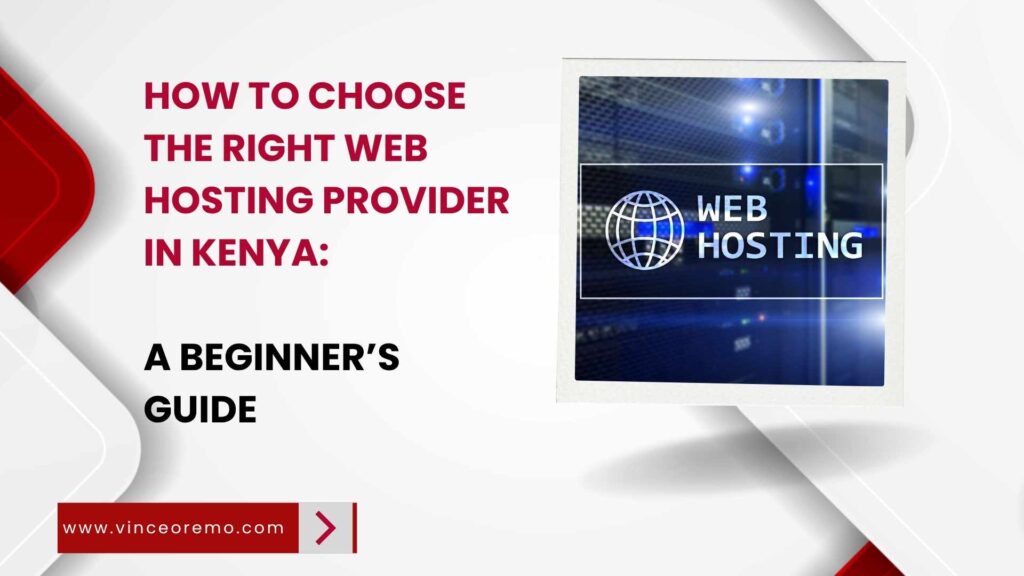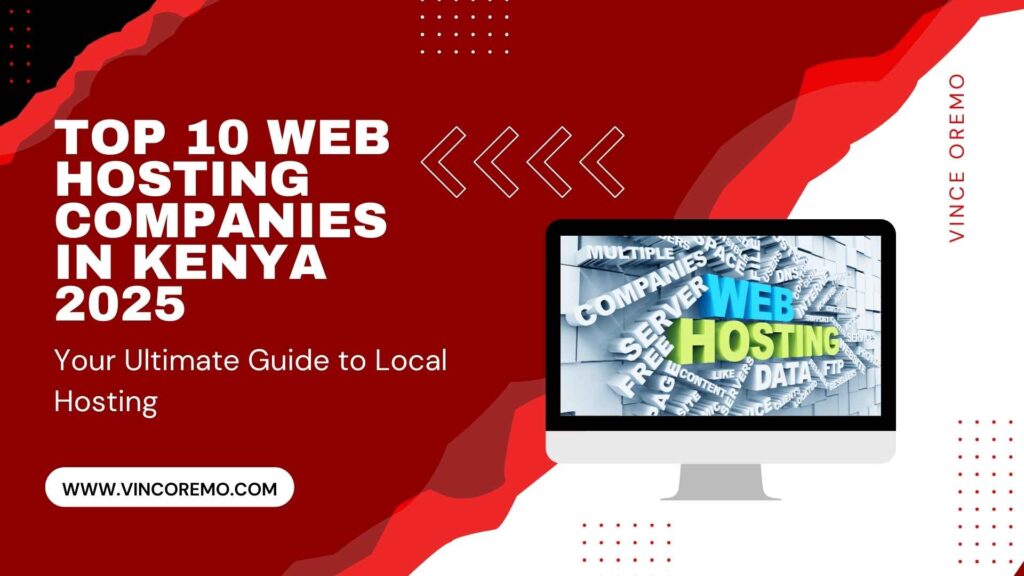A Beginner’s Guide
Starting a website in Kenya? You’re probably excited about getting your business online, but there’s one crucial decision that can make or break your digital journey: choosing the right web hosting provider. Think of web hosting as the land where you build your digital house – pick the wrong neighborhood, and you’ll face constant headaches with slow loading times, frequent downtimes, and poor customer support.
Key Takeaways
- Local hosting matters: Kenyan providers offer better speeds and customer support in your timezone
- Don’t go for the cheapest option: Balance cost with reliability and features you actually need
- Uptime is everything: Look for providers guaranteeing 99.9% uptime or higher
- Support quality varies widely: Test their response time before committing
- Room to grow: Choose a provider that can scale with your business
Table of Contents
Understanding Web Hosting Basics
Let’s start simple. Web hosting is like renting space on the internet where your website files live. When someone types your domain name into their browser, they’re essentially asking to visit your digital property. Your hosting provider is the landlord that makes sure your website is accessible 24/7.

Here’s what happens in those few seconds: your visitor’s browser sends a request to your hosting server, the server finds your website files, and then sends them back to display your website. If your hosting is slow or unreliable, this process breaks down, and you lose potential customers.
The beauty of good hosting? Your visitors never think about it – your site just works. Bad hosting? Every slow page load is a reminder that something’s wrong.
Why Choose a Kenyan Web Host?
You might be tempted by those flashy international hosting ads promising unlimited everything for $2.99 per month. Hold up. For Kenyan businesses, local hosting providers often deliver better value. Here’s why:
Speed matters more than you think. When your website files are stored in servers within Kenya or neighboring countries, they reach your Kenyan visitors faster. It’s simple physics – shorter distance, faster delivery. An extra second of loading time can cost you 20% of your visitors.
Customer support in your timezone. Ever tried calling US-based support at 3 AM their time? Good luck. Kenyan providers understand local business hours, payment methods, and even speak your language – literally and figuratively.
Payment convenience. M-Pesa integration, local bank transfers, and understanding of Kenyan payment preferences make transactions smoother. No more explaining why your international card payment failed.
Key Factors to Consider
Uptime and Reliability
Uptime is the percentage of time your website is accessible to visitors. Industry standard is 99.9%, which sounds great until you realize that still allows for about 8 hours of downtime per year. For a business website, every minute offline is money lost.
Look for providers who:
- Guarantee 99.9% uptime or higher
- Offer Service Level Agreements (SLAs) with compensation for excessive downtime
- Have redundant systems and backup power
- Provide uptime monitoring tools
Speed and Performance
Website speed isn’t just about user experience – Google uses it as a ranking factor. Slow websites rank lower in search results, which means fewer people find your business.
| Performance Factor | What to Look For | Why It Matters |
|---|---|---|
| SSD Storage | Solid State Drives instead of traditional hard drives | 3-5x faster data access |
| CDN Integration | Content Delivery Network support | Serves content from locations closer to visitors |
| Caching Options | Built-in caching systems | Reduces server load and speeds up repeat visits |
| Server Location | Data centers in or near Kenya | Lower latency for Kenyan visitors |
Customer Support Quality
Here’s a harsh truth: you will need customer support. Whether it’s help with email setup, troubleshooting downtime, or understanding billing, quality support saves you time and stress.

Test their support before you buy. Send a pre-sales question and see how quickly and helpfully they respond. If they’re slow or unhelpful when trying to win your business, imagine how they’ll treat you as an existing customer.
Pricing and Value
Cheap hosting isn’t always expensive in the long run if it hurts your business. That said, you don’t need to overpay for features you won’t use. Here’s how to think about pricing:
| Hosting Type | Typical Price Range (KES/month) | Best For | Key Features |
|---|---|---|---|
| Shared Hosting | 500 – 2,000 | New websites, blogs, small businesses | Basic features, shared resources |
| VPS Hosting | 2,000 – 8,000 | Growing businesses, higher traffic | Dedicated resources, more control |
| Dedicated Hosting | 8,000 – 25,000+ | Large businesses, high-traffic sites | Full server control, maximum performance |
| Cloud Hosting | 1,000 – 10,000+ | Variable traffic, scalability needs | Pay-as-you-use, highly scalable |
Types of Web Hosting Explained
Shared Hosting is like living in an apartment building. You share resources (elevator, utilities) with other tenants. It’s affordable and perfect for starting out, but if your neighbor throws a loud party (high traffic website), it might affect your experience.
VPS (Virtual Private Server) is like owning a condo. You have your own space and resources, but you’re still in a larger building. You get more control and consistent performance, making it ideal for growing businesses.

Dedicated Hosting is like owning a standalone house. The entire server and all its resources are yours. Maximum performance and control, but you’re responsible for maintenance (or pay extra for managed services).
Cloud Hosting is like having a network of houses you can use as needed. Traffic spike? You automatically get more resources. Quiet period? You pay less. It’s flexible but can be complex to manage.
Top Kenyan Web Hosting Providers
The Kenyan hosting market has several solid options. Rather than declaring a single “best” provider (because the best choice depends on your specific needs), here are the key players worth considering:
Established players like Safaricom Business, Kenya Web Experts, and Hosting Kenya have been around for years and offer reliability with local support. They understand the Kenyan market but might be pricier than newer competitors.

Newer entrants often offer competitive pricing and modern features to attract customers. They might have the latest technology but less proven track records.
International providers with Kenyan presence combine global infrastructure with local support. They often offer advanced features but might be overkill for simple websites.
The key is matching the provider’s strengths with your needs. A blogger needs different features than an e-commerce store.
Your Decision Checklist
Before You Choose, Verify:
- ✓ Uptime guarantee: Minimum 99.9% with SLA backing
- ✓ Support response: Test their customer service quality
- ✓ Backup policies: How often and how easily can you restore?
- ✓ Scalability options: Can you upgrade without migrating?
- ✓ Security features: SSL certificates, firewalls, malware scanning
- ✓ Control panel: Is it user-friendly? (cPanel is industry standard)
- ✓ Email hosting: Do you need professional email addresses?
- ✓ Money-back guarantee: At least 30 days to test the service
Here’s a practical approach: shortlist 3-4 providers that meet your basic requirements. Then contact their sales teams with specific questions about your needs. The quality of their pre-sales support often reflects their post-sales service.
Getting Started: Next Steps
Ready to make your choice? Here’s your action plan:
Step 1: Define your needs. What type of website are you building? How much traffic do you expect in the first year? Do you need e-commerce features? Write down your requirements before shopping.
Step 2: Set your budget. Remember, hosting is an investment in your business. Factor in not just the monthly cost, but also potential revenue loss from poor hosting.
Step 3: Research and test. Use the checklist above to evaluate providers. Don’t just read their websites – contact their support teams with questions.
Step 4: Start small but think big. You can usually start with basic hosting and upgrade as your website grows. Choose a provider that offers clear upgrade paths.
Step 5: Keep backups independent. Even with good hosting, maintain your own website backups. It’s insurance for your digital business.
Remember, choosing web hosting isn’t a lifetime commitment, but switching providers later involves work and potential downtime. Take time to choose well the first time.
Your website is often the first impression people have of your business. Give it a solid foundation with reliable hosting, and you’re setting yourself up for digital success. The right hosting provider becomes an invisible partner in your growth – you’ll forget they exist because everything just works.
Ready to take your business online? Start with these basics, choose wisely, and focus on creating content that serves your customers. The technical stuff should support your goals, not complicate them.





